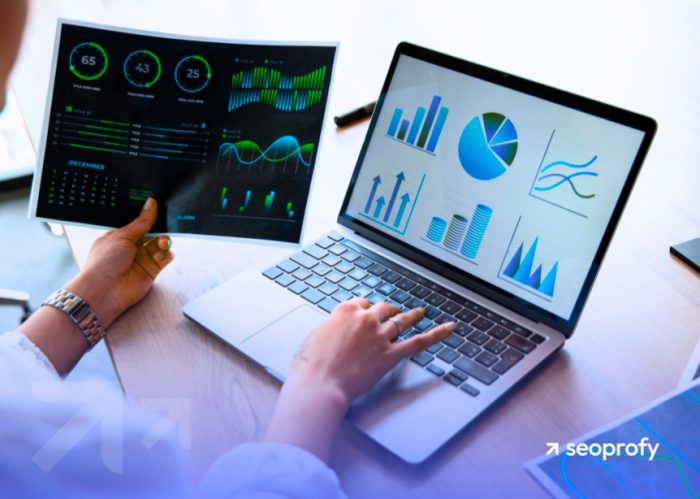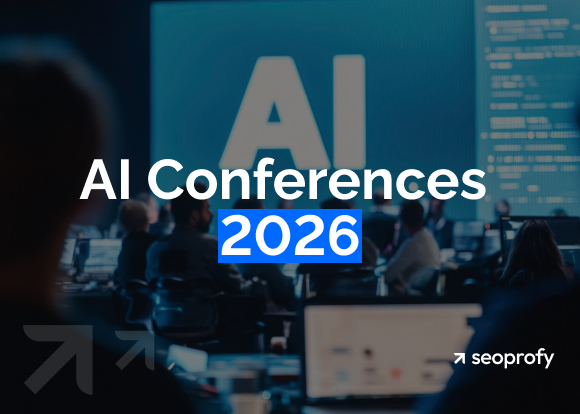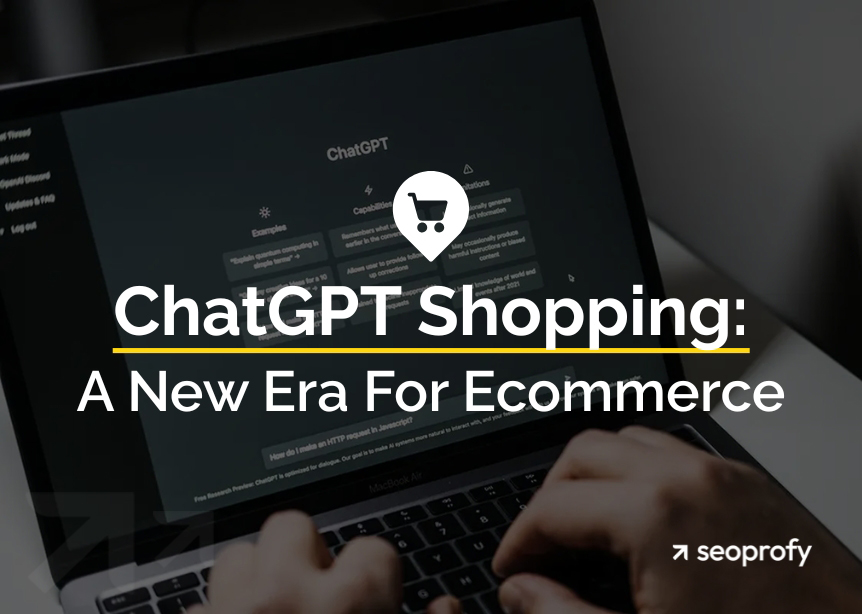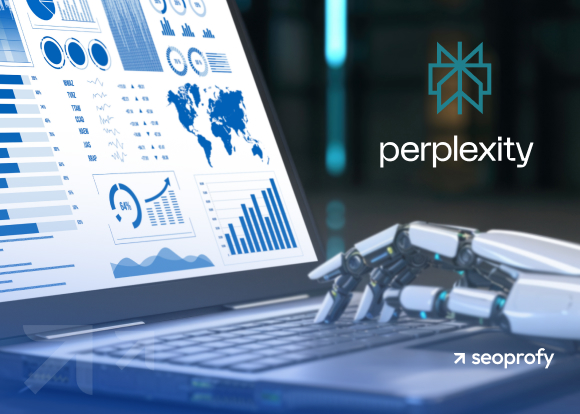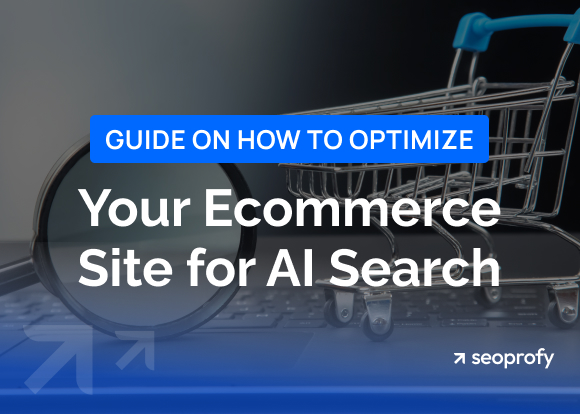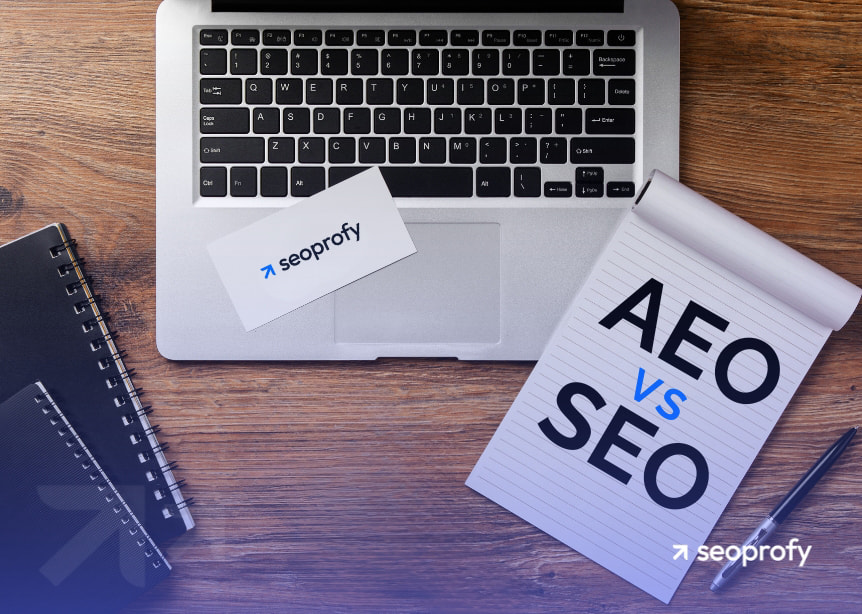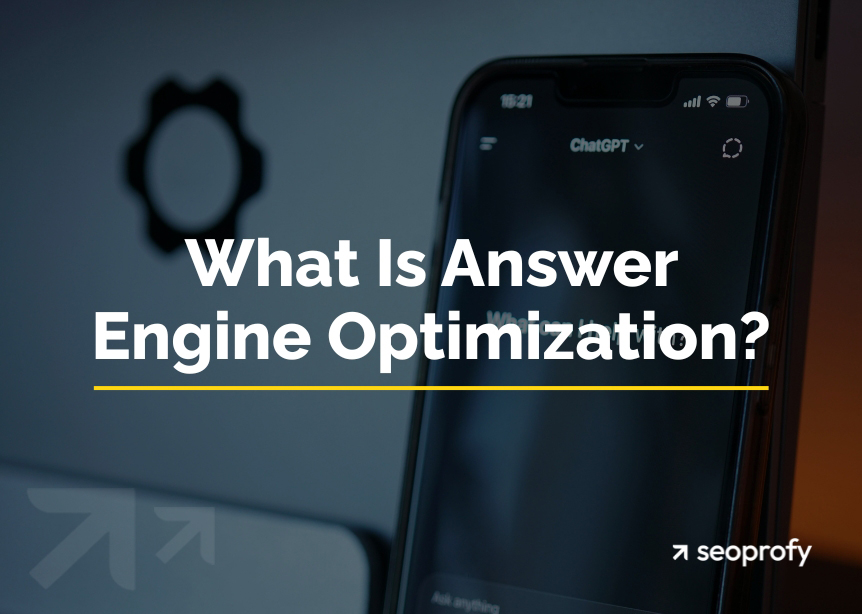AI marketing statistics show that artificial intelligence is transforming the growth and outreach sector. Most professionals in the industry claim improvements in efficiency, customer engagement, and ROI driven by the usage of AI tools in their processes.
Marketers use these technologies for content creation, strategic planning, keyword research, and other aspects to future-proof their strategies. The main use is to automate repetitive marketing tasks and provide real-time insights. As artificial intelligence (AI) adoption grows, teams gain a competitive edge by improving data-driven decision-making and driving revenue growth.
Still, AI in marketing statistics shows that challenges remain in integration, customer trust, and data privacy concerns. These issues must be addressed to increase AI’s positive impact on business operations.
- Around 38% of businesses have fully integrated AI into their marketing campaigns.
- 78% of marketing teams use AI content for SEO, A/B testing, and optimization.
- Marketers most use: ChatGPT (55% of marketers); Copy.ai: 42%; Jasper.ai: 36%; Peppertype.ai: 29%; Midjourney and DALL-E: 25%.
- Top areas of use where marketers mostly leverage AI are: image generation (69%); text generation (58%); email copy (44%); and social media content (42%).
AI Adoption in Marketing: How Widely Is It Used?
A majority of marketing leaders say AI is essential for competitiveness in 2025. In addition, around a third of organizations have already fully integrated machine intelligence into their operations despite risks of inaccuracies and a lack of warmth. Many others continue to experiment and test their potential across different channels and tasks.
This shift isn’t only strategic; it’s financial too. The artificial intelligence marketing tech sector reached $107.5 billion in 2025, up from $15.8 billion in 2021. The forecasts expect even faster growth, up to $298 billion by 2030, reshaping the entire industry, from basic content creation to social media strategy development.
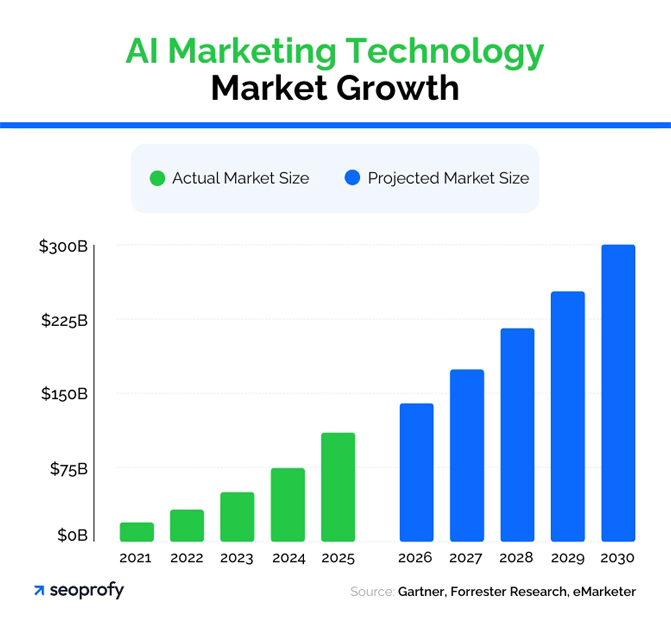
Usage Rates Across Marketing Teams
AI emerging trends affect how professionals are putting these technologies into practice. While almost all marketing organizations report using machine intelligence for planning or execution, the level of adoption varies.
Around 38% of businesses have fully integrated AI into their marketing processes, while 43% are in the process of experimenting with it without full rollout. (Coolest Gadgets)
88% of individuals in the marketing niche rely on AI in their day-to-day operations, even if their companies haven’t fully implemented it. (SurveyMonkey) 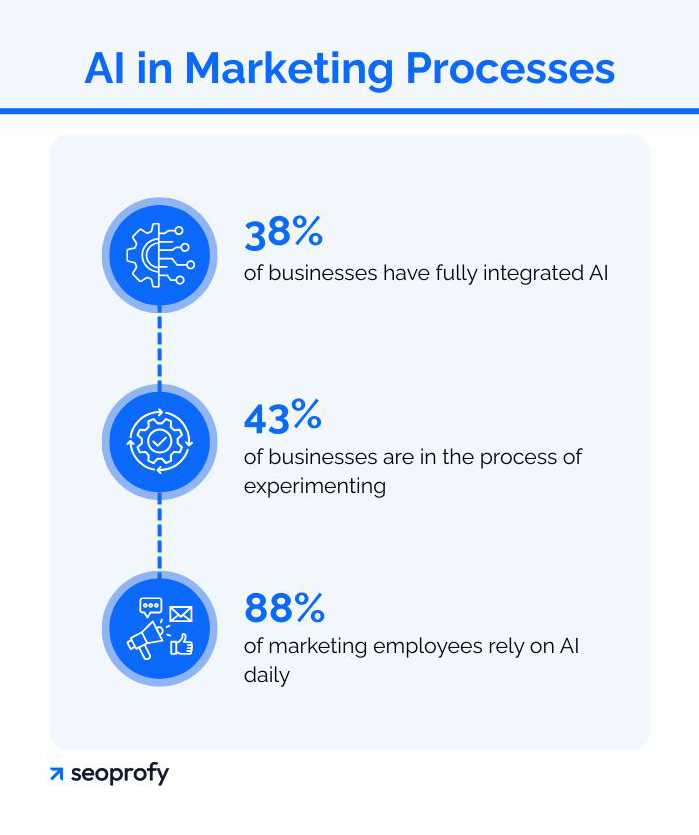
Still, only 29% of adopters consider their AI use advanced. This signifies the gap between adoption and operational readiness. (Jasper.ai)
Industry and Business Size Breakdown
AI integration is now expanding rapidly across various industries in marketing. But its pace and scope depend on the sector and company size.
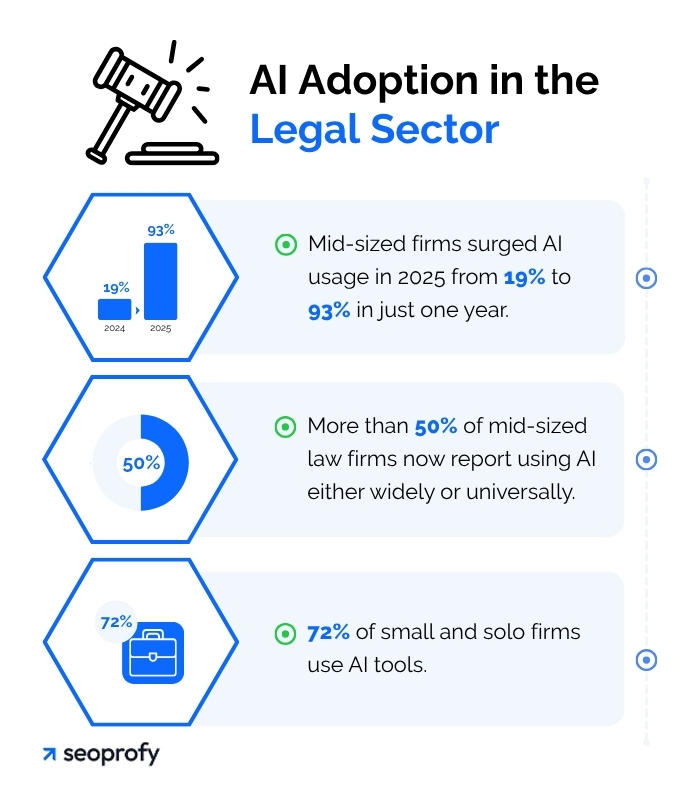
In the legal sector, mid-sized firms demonstrate broad AI usage. In 2025, the share increased from 19% to 93% in one year. (Law Times)
From this amount, 50% of them use AI “widely or universally.” (Law Times)
Across small and solo firms, 72% adopt AI tools, while only 10% use them extensively. (Law Times)
They mainly use ChatGPT or tools like Clio Duo for efficiency but lack full integration. The sector demonstrates a strong interest in AI, but concerns regarding accuracy, compliance, and explainability are hindering its broader adoption.
Ecommerce is one of the leading sectors in AI-driven customer engagement. 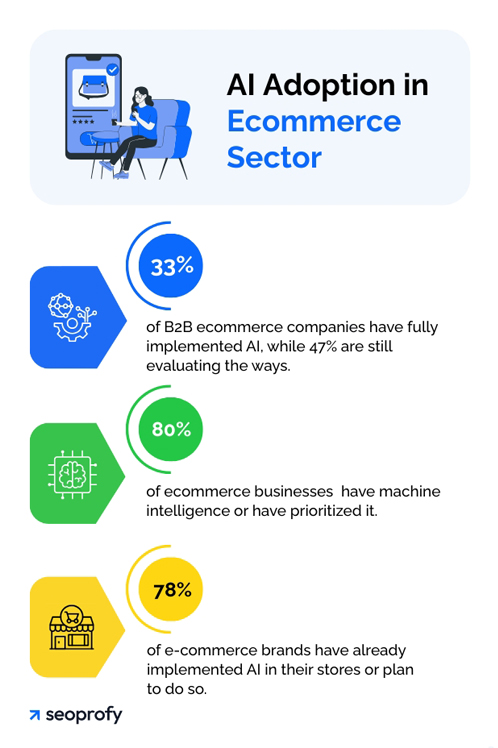
33% of the B2B ecommerce companies have fully implemented AI, while 47% are evaluating the ways. (Gauss)
Around 80% of ecommerce businesses have machine intelligence or have prioritized it. (Capital One Shopping)
In ecommerce, AI implementation is led by large retailers, while small and medium firms are catching up; 78% now either have or plan to integrate AI. (Bigsur.ai) 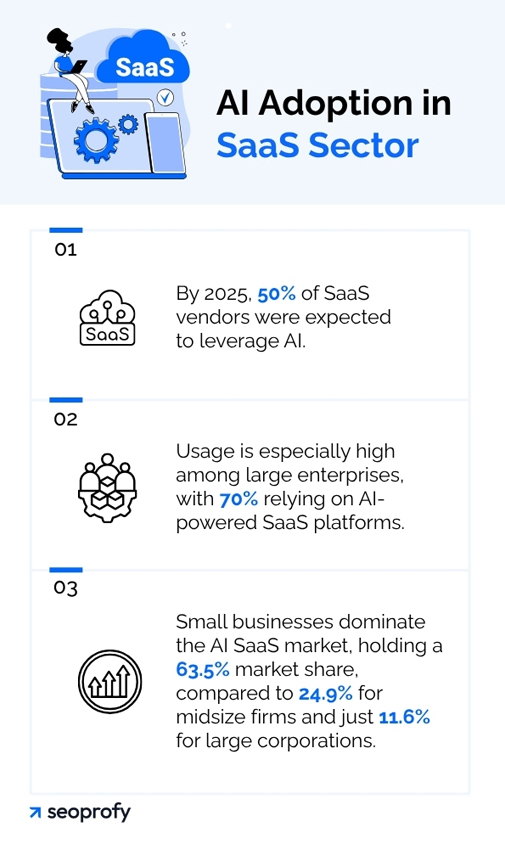
AI usage within SaaS platforms plays a key role in expanding the marketing market size, as these solutions become essential for modern digital strategies.
By 2025, 50% of SaaS vendors were expected to leverage AI. (Zylo)
Usage is especially high among large enterprises, with 70% relying on AI-powered SaaS platforms. (IBM)
Small businesses dominate the AI SaaS market, holding a 63.5% market share, compared to 24.9% for midsize firms and just 11.6% for large corporations. (Consainsights)
AI-Powered Tools for Marketers
The rise of AI in marketing boosts productivity, enhances personalization, and drives smarter decisions. Professionals widely use new technologies, from content generation to customer forecasting and process automation. AI use can provide improvements at every stage of a campaign. Trusted sources like the Marketing AI Institute have covered the growing impact of AI on business strategies.
Generative AI
Generative AI is one of the fastest-growing areas, transforming how marketing content is created and tested. Such tools rely on natural language processing to create human-like text. It allows personalizing outreach and enabling smoother interactions to attract more visitors and leads.
For example, around 62% of companies have adopted generative tools into at least one core business process as of Q1 of this year. (Sqmagazine)
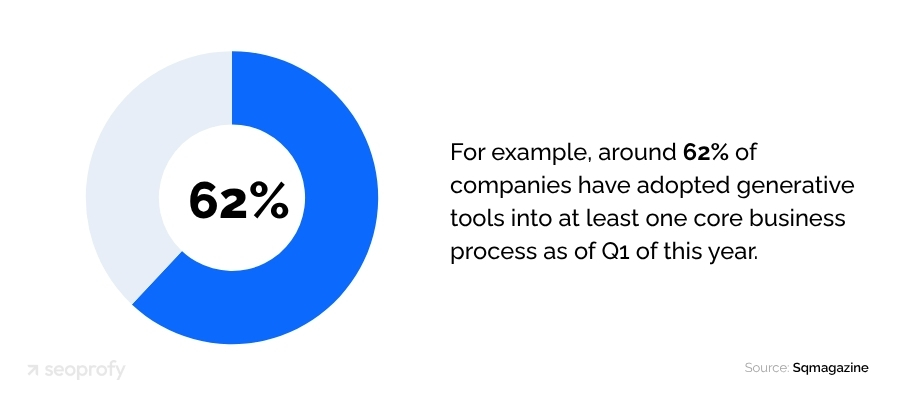
The percentage is even higher across marketing teams; 78% of them use AI content for SEO, A/B testing, and optimization. (SQMagazine)
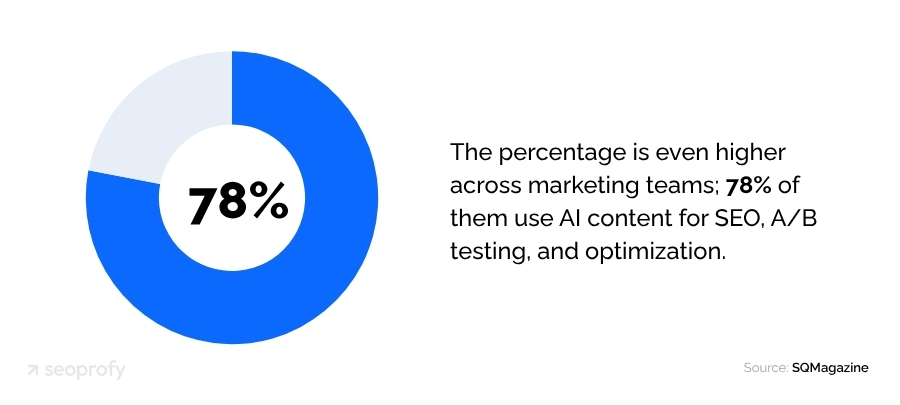
Across all AI content platforms, the most used are:
- ChatGPT: 55% of marketers;
- Copy.ai: 42%;
- Jasper.ai: 36%;
- Peppertype.ai: 29%;
- MidJourney and DALL-E: 25%.
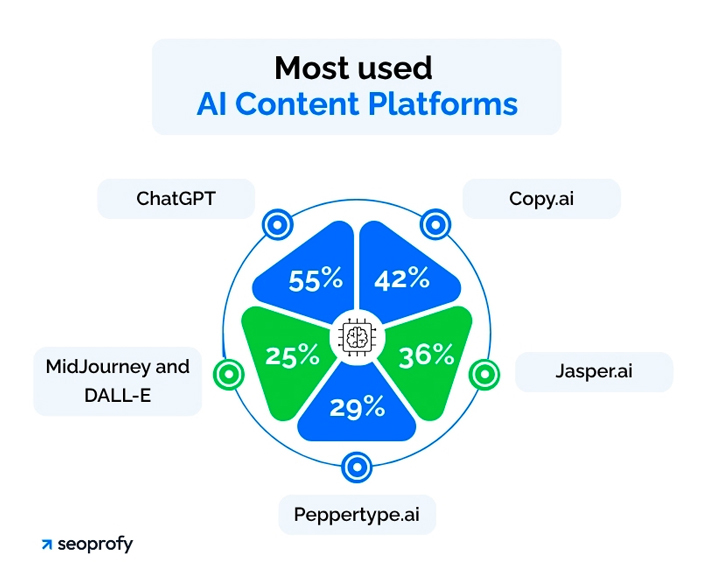
As for the areas of use, marketers mostly leverage AI for
- Image generation (69%);
- Text generation (58%);
- Email copy (44%);
- Social media content (42%).
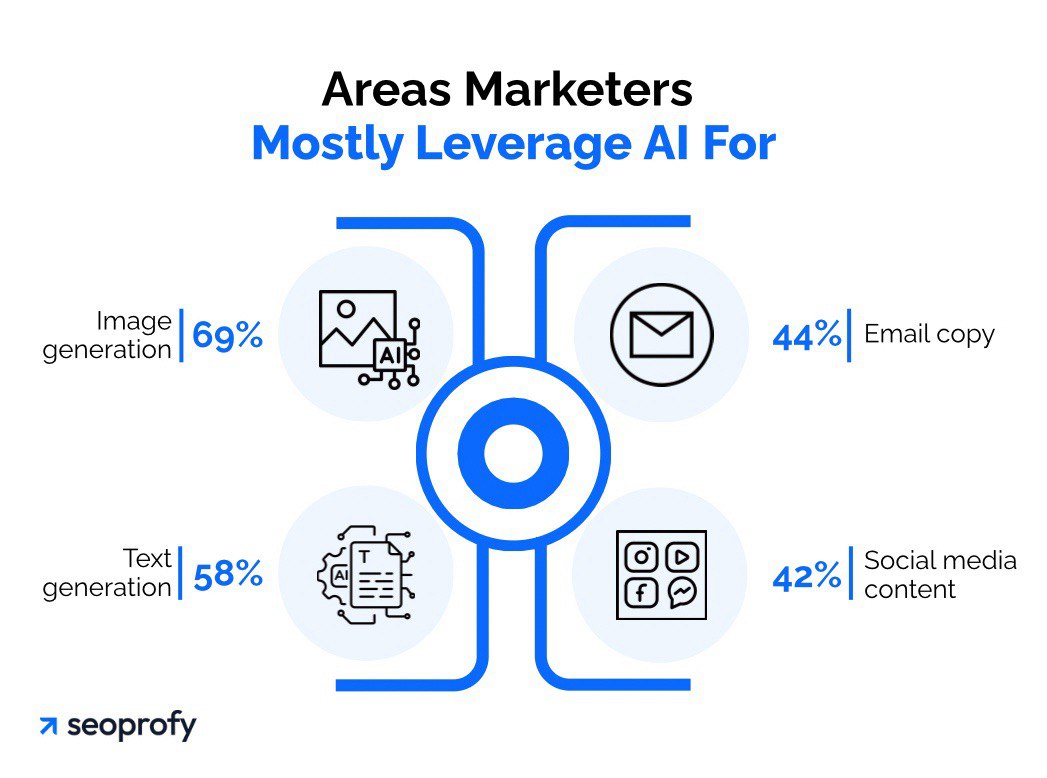
These content creation tools are integrated into marketing workflows to speed up delivery, boost engagement, and support SEO strategy through features like keyword optimization, metadata generation, and enhanced personalization.
Predictive Analytics
Predictive analytics helps to move from strategies to proactive planning, enabling marketers to forecast future outcomes of campaigns and personalize engagement based on real-time data. The AI usage for predictive analytics is very common across the marketing industry; it’s used by 74% of organizations. The key functions of the usage include:
- Audience segmentation;
- Consumer behavior forecasting;
- Customer insights;
- Data-driven decision-making;
- Marketing outcomes of campaigns.
With adoption so high, AI’s impact on long-term strategies is evident. It helps teams improve targeting, messaging, and timing. In particular, 91% of execs agree that new technologies improve decision-making.
Automation
AI-powered marketing automation allows specialists to reduce manual work and focus more on creative and high-impact tasks. Common automated tasks include e-mail personalization, social media platforms posting, lead scoring, and cross-channel targeting.
For example, 94% of organizations have integrated AI into their marketing operations. (Epsilon)
Around 25% of tasks are automated, with expectations to rise to 30% by 2026. (9CV9)
Popular AI systems are
- Zapier: for cross-app automation with GPT integrations;
- HubSpot, Salesforce Einstein GPT, Marketo, Adobe, Hootsuite, and Constant Contact: AI-powered segmentation, scoring, email automation, and analytics.
As technologies continue to evolve, they can provide benefits like faster execution of repetitive tasks or reliable campaign testing.
There is a 20% average lift in conversion rates through personalization with AI tools. (9CV9)
Where AI Makes the Biggest Impact
Yes, the use of AI in marketing can reshape how teams develop strategy, execute tasks, and measure performance, driving growth. The main impact of these tools is increased competitiveness in an evolving digital marketing.
Top Use Cases of AI in Marketing: Content, SEO, Personalization
AI SEO tools power some of the most critical aspects of marketing. For instance, tools like ChatGPT and Jasper generate blogs, scripts, and social media marketing, freeing SEO experts to develop strategy and brainstorm ideas. AI-generated content can drive:
- 83% higher engagement; (Content Marketing Institute)
- 47% longer time on page;
- 39% deeper scroll depth;
- 20% higher conversion rate amid personalized short videos. (Exemplary.ai)
In addition, these tools can help with AI SEO implementation success and search visibility. Platforms like SurferSEO or SearchAnalytics automate keyword planning, technical aspects, and relevant structure for texts.
The other important aspect in marketing strategies is personalization. AI SEO stats show that tailored content can ensure more leads and higher revenue.
Segmentation and product recommendations boost average order value by 40% and lift conversion rates by 41%. (NumberAnalytics)
Marketers leveraging AI forecasts see 10–30% increases in campaign effectiveness and 10–15% higher customer retention. (Keywordkings)
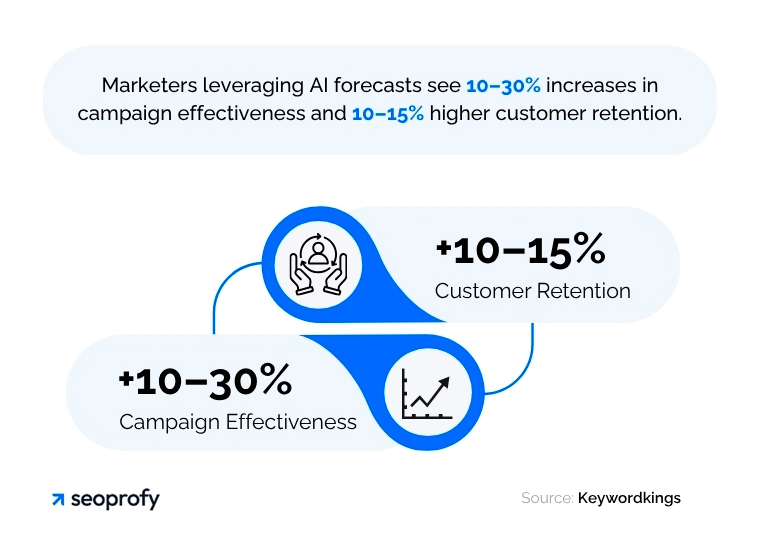
Productivity and ROI Gains
Beyond strategy, artificial intelligence boosts operational efficiency and measurable returns. Time savings can also be a significant advantage, letting you focus on more important tasks and producing more AI content for SEO.
For instance, AI technologies can provide:
- 70% reduced research time;
- 45% increased speed of content drafts;
- 55% reduced revision time. (NumberAnalytics)
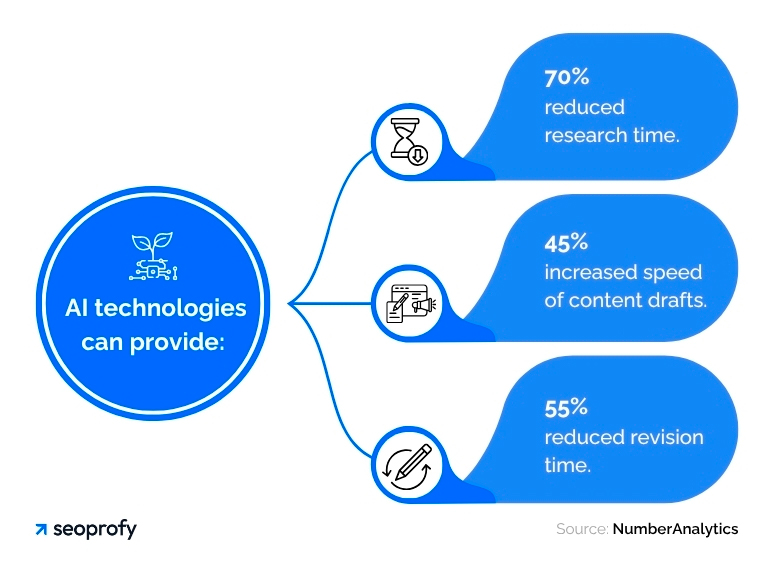
The other important factors are production expenses and ROI efficiency.
AI tools reduce production costs by 32%. (Deloitte Digital Transformation Survey)
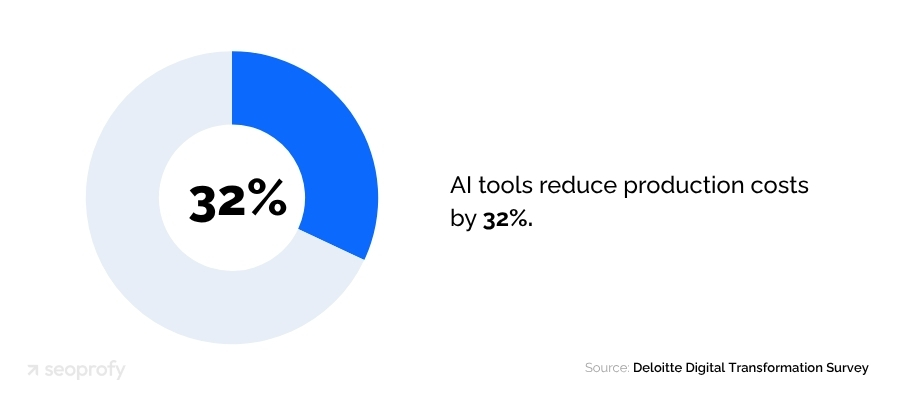
These technologies can also speed up delivery by 37%. (Workfront State of Work)
Meanwhile, some brands report a 200-450% increase in their ROI. (Market Pulse)
Marketers’ Sentiment Toward AI
Despite rapid AI tool usage and the improvements it can offer, marketing professionals also have concerns. Sure, it may be a powerful tool to unlock growth and stay ahead of a marketing business landscape, but there’s also a hesitation. Let’s take a look at how professionals really feel about AI and the barriers still holding marketing teams back.
Optimism vs. Caution
Nowadays, marketers rely on artificial intelligence as a part of their daily workflows.
While the majority (69%) recognize the power of AI technology to transform business operations and boost performance, only 17% admit to mixed emotions, still reviewing real-world integration and long-term impact on their roles and jobs. (SurveyMonkey)
One of the most common fears is that machine intelligence might replace their jobs; it’s admitted by 60%, a jump from 36% the year prior. (Influencer Marketing Hub)
The most common concerns regarding AI use in marketing are expenses, data privacy, and the general fear of change. Each of these issues totals 51%. (Epsilon)
The other barriers include lack of skills (46%), organizational alignment (45%), buy-in from stakeholders (31%), and regulatory challenges (29%). (Epsilon)
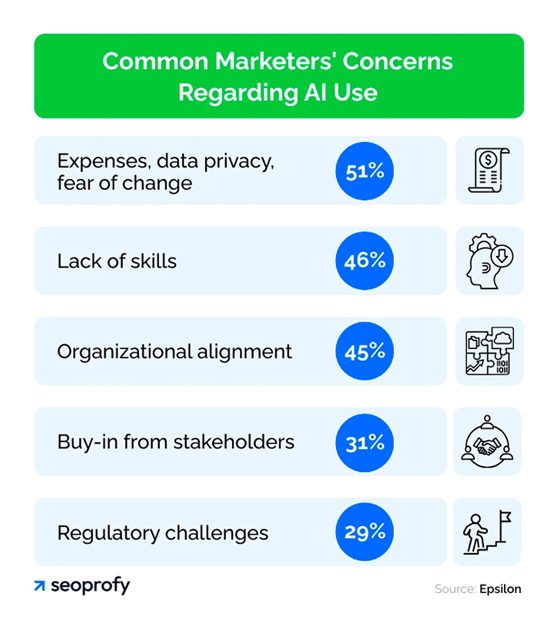
Job Impact and Upskilling
As AI adoption accelerates across the industry, marketing leaders face growing pressure to keep up.
- Over 75% of marketers see AI skills as a gap in their professional development. (Marketing week)
- 68% still receive no formal Gen AI training, leading many to rely on self-learning or external programs. (Complete AI Training)
- The shift toward automation is empowering marketers to focus more on strategy, data analysis, and ethical oversight. Human skills like adaptability, creativity, and digital literacy are rising in value, especially as generative AI tools’ content becomes more common.
- Still, only 47% understand how to use these technologies strategically. Thus, integration requires better support and clearer direction. (Hubspot)
Barriers and Challenges to AI Adoption
As AI continues to reshape the marketing landscape, many organizations face obstacles in adoption. From growing privacy concerns to limited budgets and technical constraints, marketing professionals and consumers are approaching artificial intelligence with caution.
Data Privacy and Ethical Concerns
AI marketing stats show data privacy concerns as the most cited barriers among professionals and consumers. For example, many specialists worry that data bias in machine learning models can lead to skewed insights and harm audience targeting accuracy.
40.4% of teams note that privacy is a top reason they hesitate to fully adopt these tools in their marketing campaigns. (CoSchedule)
The other common issue is legal uncertainty, as 49% cite regulatory risks. (Statista)
48% worried about misinformation tied to AI-generated content. (Statista)
As for consumers, their concerns are even more highlighted. Thus, companies must be careful and respectful when integrating artificial intelligence to ensure trust and transparency for their clients.
81% of Americans fear companies misuse personal data. (Pew Research)
82% support legal disclosure of robotics participation in customer interactions. (New York Post)
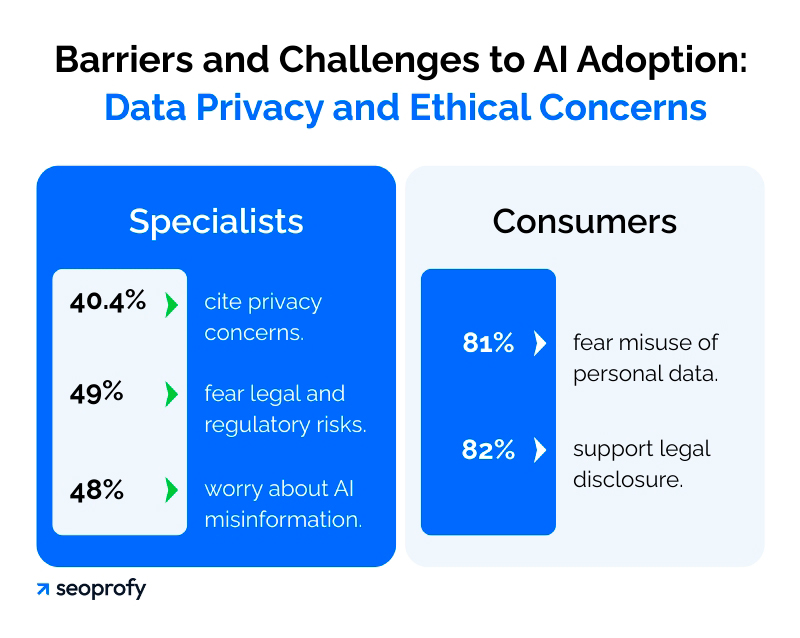
Technical and Budget Constraints
Beyond ethics and trust, technical limitations can also postpone machine learning integration. The most common challenges are tool implementation, the lack of skills, and budget constraints.
69.8% of marketers struggle with tool integration, poor usability, and data compatibility issues. (Influencer Marketing Hub)
More than 34% of marketing teams identify cost as a critical barrier. This is especially challenging for small companies. (Influencer Marketing Hub)
43% cite the lack of a clear artificial intelligence strategy as a major problem. (Marketing Profs)
43% of specialists admit their companies didn’t provide Gen AI training, leaving them unprepared for integration. (LinkedIn)
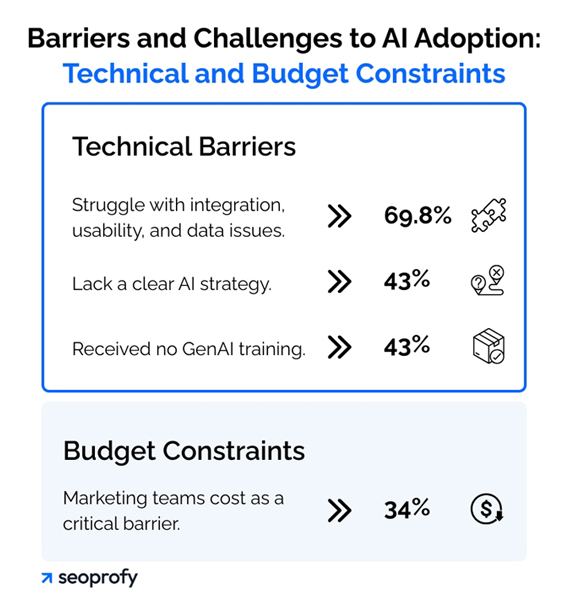
Without unified SEO goals, marketing organizations often fall short in aligning AI with broader business success or in using it for smarter audience segmentation and content creation.
Consumer Perception of AI in Marketing
When implementing AI tools into your processes, it’s necessary to understand what consumers think about these changes. With all innovations, we should remember that customer trust is a key factor in engagement. At the same time, demand for AI-powered content is high among Gen Z and millennials. (Capgemini)
Trust and Preferences
As for today, consumers are cautiously optimistic about the impact of the AI marketing trend. These customer preferences should be noted by marketers.
Around 55% of US consumers feel positive toward companies that use artificial intelligence. (Optimove)
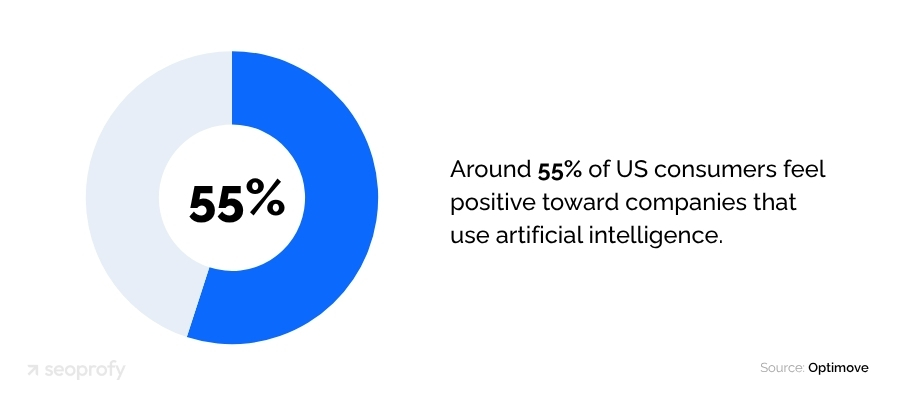
57% still prefer human-created content. (Click)
The ability to spot the difference remains high; 63% of users can differentiate between human- and AI-generated copy. (Click)
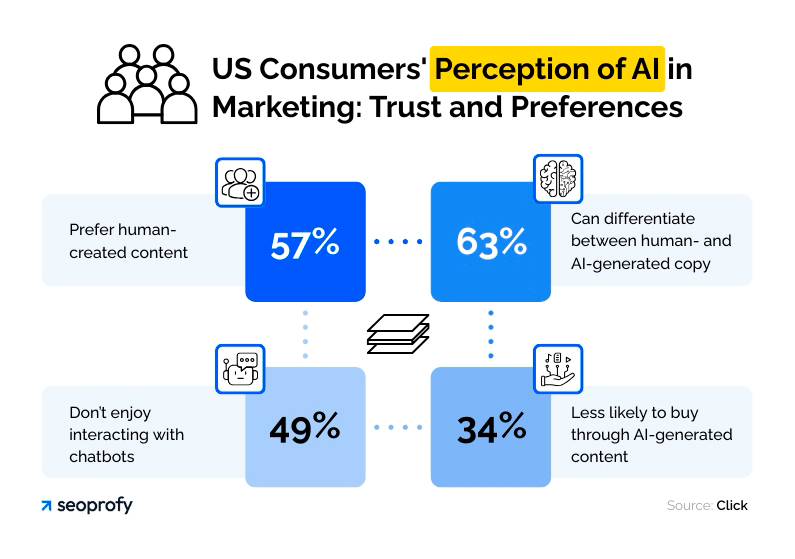
The chatbot aspect also reflects these trust patterns, underlining the need for smoother and more transparent AI integration.
While 71% of companies deploy chatbots, only 16% of consumers use them regularly, and many aren’t satisfied with robotic behavior and poor interaction design. (WSJ)
49% of users state they don’t enjoy interacting with chatbots during their customer experience. (MTM)
Moreover, 34% say they’re less likely to buy if they know content was generated by artificial intelligence. (Click)
Personalization Expectations
While there still are trust issues, demand for AI-driven personalization is rising.
Most consumers find personalized marketing appealing, and 72% expect it from brands. (SmarterHQ)
76% of all consumers are more likely to buy with higher customization. (McKinsey)
Besides, more than 75% of shoppers want AI-generated product recommendations. (Capgemini)
The main issue that may halt personalization is privacy concerns.
For now, 34% of buyers have privacy concerns regarding AI integration. (Optimove)
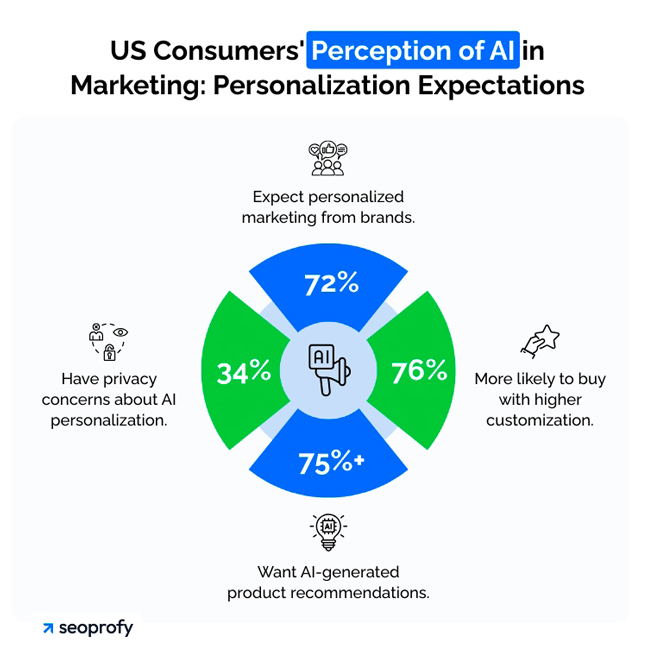
This shows a tricky outlook: consumers embrace artificial intelligence in marketing when it’s used to enhance relevance, but they expect ethical data use and transparent communication.
AI Marketing in 2026 and Beyond
AI marketing statistics show rapid expansion of use cases. As we define, they can provide not only automation but also personalization, creativity, and real-time insights. Brands that harness agentic tools, transparency-first personalization, and platform-aware advertising will have a competitive advantage in the market.
In 2025, AI, especially generative engine optimization services, will be a co-creator, and this usage will grow fast over the next years. Tools like ChatGPT or Synthesia can work alongside marketers, developing ideas, generating brand-aligned campaigns, and providing insights that fuel creativity.
Predictive tools also have a wide range of uses. Big brands like Delta are using digital twins and forecasting models to improve sales and plan campaigns. Companies that leverage AI overviews SEO tools can automate content audits, generate summaries, and optimize web pages more effectively for search engines.
Some of the biggest AI marketing trends include:
- AI influencers: Virtual brand ambassadors who chat with followers, react to emotions, and are available 24/7.
- Multimodal AI: Tools that combine text, images, and audio to build content that adapts to each platform.
- Dynamic personalization: Ads, websites, and emails that instantly change based on user behavior.
At the same time, there are concerns. Many marketers worry about bias in artificial intelligence models and a lack of in-house skills to manage these tools. With more ads showing up in chat-based platforms like Copilot, staying ethical and transparent is more important than ever.
Looking to future-proof your marketing? Connect with SeoProfy, a reliable data-driven SEO company, for a custom roadmap to smarter decisions.

